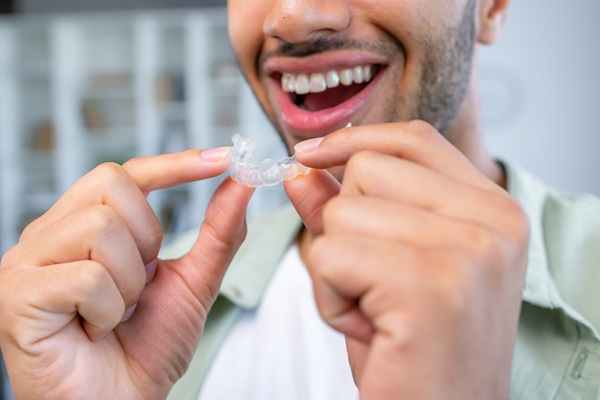Tips for Brushing and Flossing During Invisalign Therapy

Invisalign® is one of the most popular ways to undergo teeth straightening treatment. However, with that being said, it is still crucial to maintain good oral hygiene throughout the process. Keep reading to find out what a general dentist has to say about brushing and flossing.
A quick guide to oral hygiene during Invisalign® treatment
Outlined below are a few tips on brushing and flossing during Invisalign® treatment. This information comes directly from a general dentist who wants to reiterate the importance of oral hygiene.
1. Brush after every meal
Traditionally, general dentists recommend brushing twice a day; however, when it comes to Invisalign® treatment, it is better to brush after every meal. Because the teeth stay enclosed by the Invisalign® aligners, making sure that any left behind food or debris is cleaned off will go a long way in oral health. Using a soft-bristled toothbrush will ensure that overbrushing does not occur, thus keeping the enamel intact.
2. Floss at least once a day
Flossing at least once a day is always important; however, when it comes to Invisalign® treatment, it is crucial to abide by this. Because the teeth are enclosed by the aligners for the majority of the day, ensuring that left behind food does not remain in between the teeth is important.
3. Be gentle when flossing
During Invisalign® treatment, the teeth are constantly shifting. Of course, this shift is positive because it means the treatment is working. However, because of the constant shift, it is important to understand the sensitivity that is involved. With that being said, when flossing each day, it is necessary to be gentle. Flossing can be difficult especially if there are tight spaces involved. Gently flossing in between each tooth will ensure that the gums stay healthy; however, just remember to be careful when doing so.
4. Use a fluoride-based toothpaste
Toothpaste that contains fluoride can be extremely beneficial to the teeth, especially when undergoing Invisalign® treatment. Because the teeth are enclosed by the aligners for most of the day, the teeth can become susceptible to natural bacterial growth, which can wear down the enamel. Using fluoride-based toothpaste a few times a week will ensure that the enamel stays strong and mineralized.
Other oral hygiene tips during Invisalign® treatment
Aside from the brushing and flossing tips that are listed above, general dentists also recommend rinsing with mouthwash or saltwater a few times a week. Because the aligners enclose the teeth so much, bacteria can naturally grow. Rinsing can keep bacteria at bay while also ensuring good breath.
Talk to a general dentist today
When undergoing Invisalign® treatment, it is advised to continue to follow good oral hygiene. These can go a long way in ensuring that oral health stays in good shape throughout the treatment process. Any additional questions or concerns about oral hygiene can be addressed by a general dentist. To find out more or to get scheduled for an appointment, reach out to our Orange Park office today.
Request an appointment here: https://orangepark.centerfordentalexcellencefl.com or call Orange Park Center For Dental Excellence at (904) 639-5852 for an appointment in our Orange Park office.
Check out what others are saying about our dental services on Yelp: Invisalign in Orange Park, FL.
Related Posts
Dental crowns can treat many dental issues, including cavities. Your dentist will always aim to keep your natural teeth. Placing caps on them can help the dentist do this. Cavities can eat away and weaken teeth. These teeth will need more support after treatments. Here are the details about when dental crowns can help after…
Dental crowns and dental bridges are effective restorations dentists use to address missing or damaged teeth. While they share some similarities, they differ when it comes to the placement process, their purpose, and the number of teeth involved. Learn which is best for you to restore your smile.The dentist will use dental crowns to restore,…
Dental crowns are a popular dental restoration, effectively preserving and enhancing the function of damaged or weakened teeth. These custom-made caps are designed to fit over the existing tooth, providing both structural support and improvements in your smile's appearance. However, not all dental crowns are created equal. The type of dental crown you choose can…
Dental crowns are a popular option for restoring a smile, but they offer more benefits than you may know. A dental crown is a customized, tooth-shaped cap placed over a damaged or compromised tooth to help its shape, size, appearance, and strength. Discover common signs indicating a dental crown is right for you.A dental crown…






